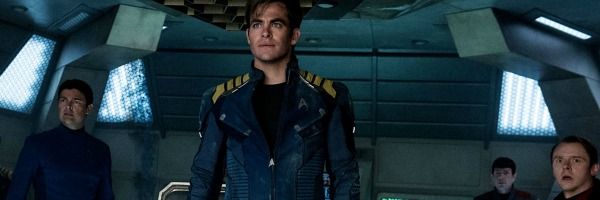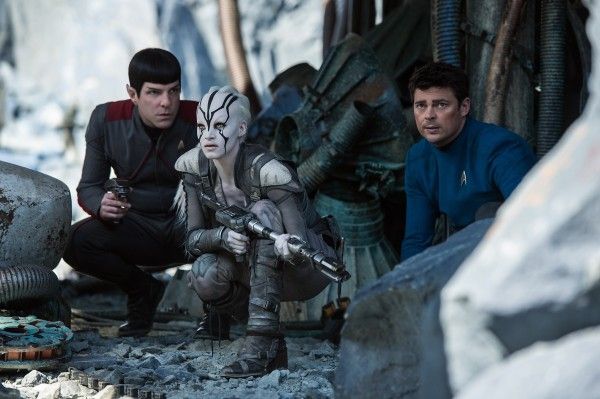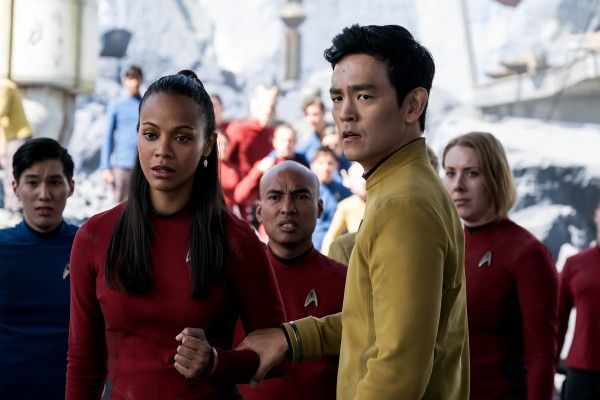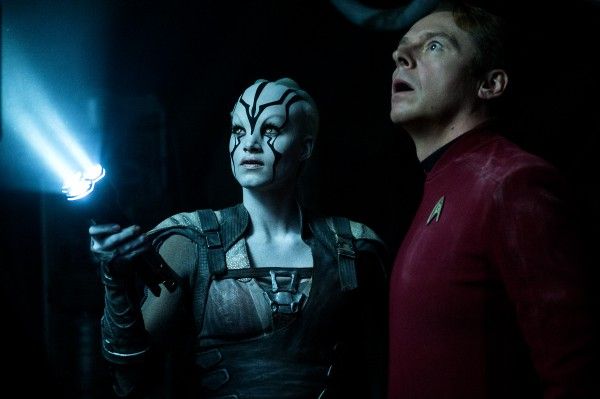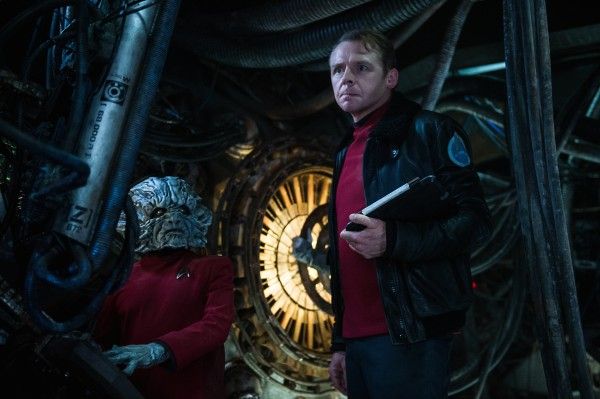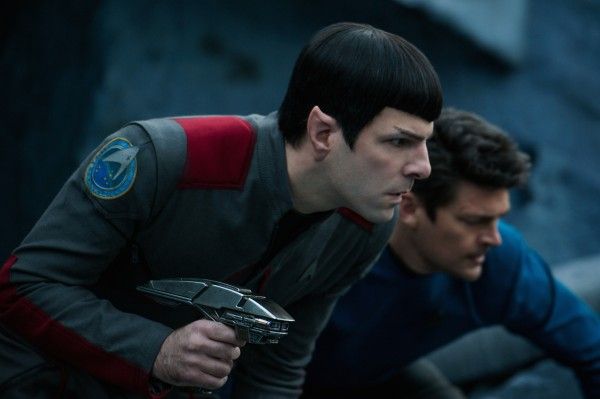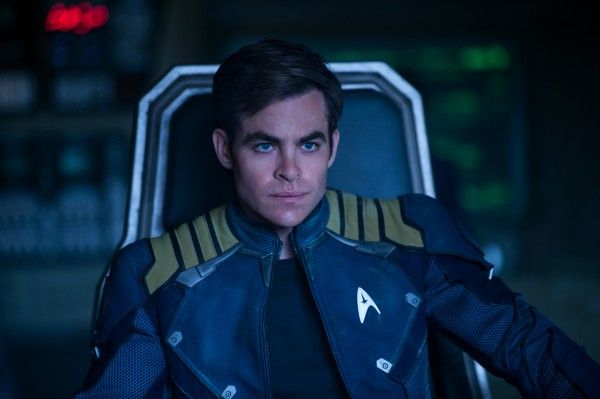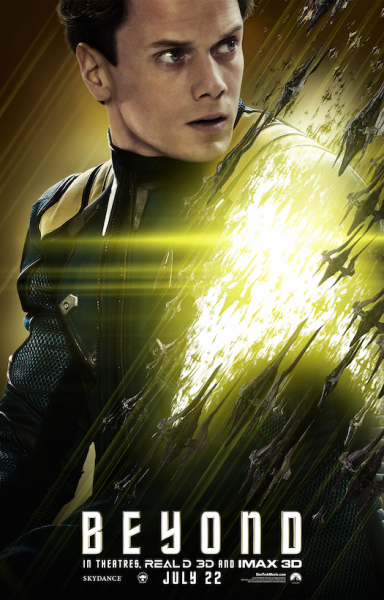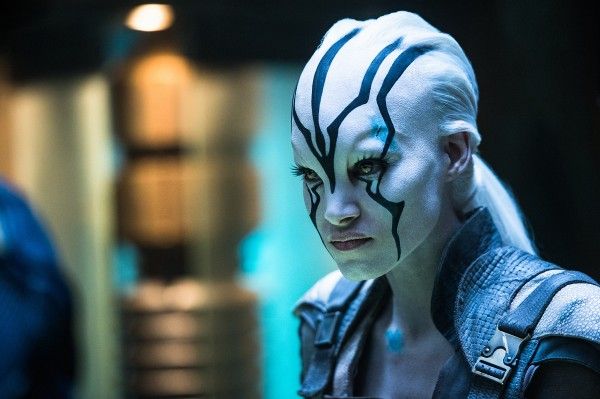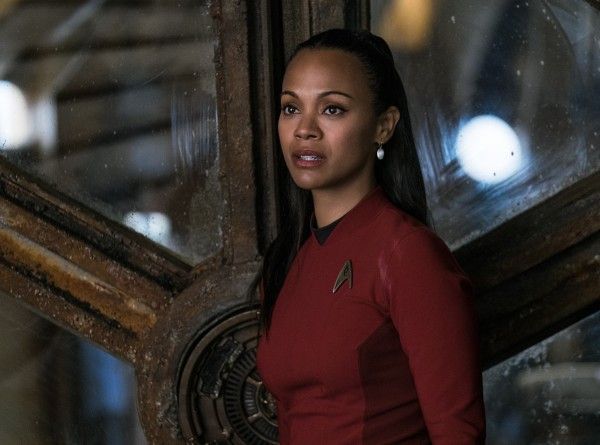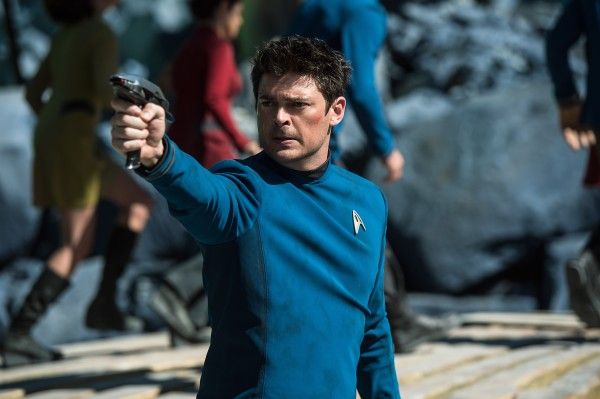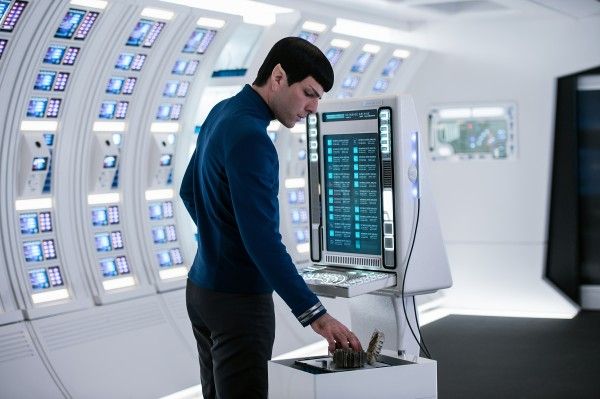Created by Gene Roddenberry and reintroduced by J.J. Abrams in 2009, the Star Trek franchise celebrates its 50th anniversary this year, as the next installment, Star Trek Beyond, sees the U.S.S. Enterprise and her intrepid crew exploring the furthest reaches of uncharted space. With director Justin Lin at the helm, they encounter a mysterious new enemy who puts them and everything the Federation stands for to the test.
During a conference at the film’s press day, director Justin Lin, producer J.J. Abrams, executive producer Lindsey Weber and screenwriters Simon Pegg and Doug Jung talked about embracing the existing mythology while also making a movie that’s accessible for everyone, watching this franchise continue to evolve, finally including the LGBT community, that everything they shot is pretty much on screen, the biggest challenges of the shoot, developing the villain, the tragic loss of actor Anton Yelchin, and the future of this franchise. Lin also talked about currently working on the script for Space Jam 2, and how he’s approaching it from more of a character standpoint than as an action film. Be aware that there are some spoilers discussed.
Question: This is the 50th anniversary of Star Trek, so what were the challenges of paying homage to the original while also making a movie that you could see without having seen any of the previous incarnations, including the first two with this particular cast?
SIMON PEGG: It was a question of combining an existing mythology and embracing that mythology, wholeheartedly, and also making sure that nobody felt shut out, so that if you were coming to Star Trek for the first time, you didn’t feel like you weren’t in on it. It’s a difficult tightrope to walk, really. If you fall on either side of it, you risk alienating a large portion of your audience. We were always aware that we were walking across a gigantic precipice.
Lindsey, what were some of the challenges for you, as a producer, to make a film that fans will love, but that will also be loved by everybody?
LINDSEY WEBER: The best thing you can do, as a producer, is pick the right collaborators. I was so fortunate to have people who each have their own pre-existing relationship with the franchise. I’m a longtime fan. I went to Star Trek conventions, as a kid, and had a card in my wallet in high school that said, “Member of Starfleet Academy.” It was really a privilege to work on this franchise. Justin, obviously, had his own vision for what he wanted this movie to be, and certainly has this incredible visual sense and long relationship with these characters. All I had to do was help them keep putting one foot in front of the other, and they did a beautiful job.
J.J., how did Simon Pegg come onto this as a screenwriter, and how did he get paired with Doug Jung?
J.J. ABRAMS: When we started working on this movie, we’d had prior experience with Doug, as a screenwriter, and Simon is my British brother, formerly of the European Union. And so, it made perfect sense. As crazy as it seemed, on one level, it was also so obvious to ask if Simon would be interested in working on the script. For a moment, it was a little like juggling cats, when you’re figuring out how it’s going to work. When you put any two writers together who have not worked together, it’s going to be tricky for a moment, but they very quickly found a rhythm. Justin was very clear about things he wanted, that were important to him. When you have a movie where there’s a schedule, you simply have to figure out a way to squeeze every great idea out in the time you’ve got, never giving up and always assuming that you’re going to have a better idea, but that this is the idea for right now. It’s always a leap of faith that it will work.
But the one glue, as someone who an observer of what was happening because I was working on The Force Awakens, at the time, was this group of people, some of whom had Starfleet Academy cards in their wallets and others who were fans since childhood and who grew up with it with their families, and I saw how the love of this world really being the thing that united them. In a crazy way, the story of Star Trek and of facing crazy odds and how everyone is critical to survive it was a little bit of what the experience was, making the movie. Every single person was absolutely critical to making this thing work, and they all pulled together to get this thing going in the right direction. It was a wonderful thing to see. And because I’d been involved in the couple of movies prior, it was fun for me not to have to be in the fray the way they were, day to day.
Justin, what was it that made you fall in love with the original Star Trek TV series?
JUSTIN LIN: My family immigrated to the States when I was eight. They had a little fish and chips shop, and they would close at 9 and we’d have dinner at 10. At 11, [Star Trek] came on Channel 13, so my brothers and I would talk our way into just hanging out with them. So, from 8 to 18, that was our level of engagement and our family time. I remember moving to a new country felt like it was just the five of us. But watching Star Trek, it instilled in me that family is not just by blood. It’s through shared experience. That’s what Star Trek gave me. Our engagement was through re-runs, but every night, it was a new adventure with new obstacles and new challenges. That sense of discovery and exploration was a big part of growing up.
My friends all had the little Star Wars figures, but we didn’t have any of that. We had Star Trek. Now, I have a 7-year-old and he’s a big Star Wars kid. I’m trying to convert him. Since I work all the time, I bring him on set and try to shoot a shot with him. In the Fast movies, he’s always the little kid that’s looking at cars. In this, he really wanted to be an alien. I said, “Okay, cool.” He was so adamant and he knew exactly what he wanted. He wanted to be green and he wanted ears. So, we shot it and, later on, I was talking to him and he finally said that he wanted to be Yoda. When you see the film, it’s a young Yoda.
J.J., after directing the first two films, what was it like to see this third movie go off and evolve on its own?
ABRAMS: Honestly, it was a bittersweet thing that was far more sweet than bitter. The bitterness was only the jealousy that I felt, that they all got to be together. But when I was watching dailies and seeing what Justin was doing with the new cast and with this story, the truth is that I felt an odd fatherly pride that these people who I adore and who are like a family, get to live on. And then, to see what Justin was doing, pushing the envelope in ways that I wouldn’t and I couldn’t, and doing things that taught me lessons in action and in character, the fact that he cared so long and so deeply about Trek, you could just see in every scene, him putting that passion into it. I knew that the story was in incredible hands, but I couldn’t help but envy all of [them] for the time they spent together.
How fun was it to have the throwbacks in this film, like with Captain Kirk fighting another Captain, while not alienating your audience that wouldn’t be familiar with them?
PEGG: That was Justin’s thing, and we had to figure out the thrust of their beef and what it means that they’re both two sides of the same coin.
DOUG JUNG: We were trying to find a villain that felt worthy of Kirk, but also could be a vehicle for bringing up some of those great thematic things that Star Trek always does. So, to have this darker mirror of Kirk represented in Idris Elba’s character seemed like a real natural, fun place to go, and in the spirit of some of those characters we’ve seen before, without specifically addressing any particular episode. There is a backstory for that character that ties into Star Trek, in a really nice way. It fell out organically and seemed like a really good fit for what we were trying to accomplish.
Star Trek has always been great with representing racial diversity. How important was it to finally start including the LGBT community in that?
JUNG: I think it was hugely important, but one of the things in how we approached it was to not really make that big a deal of it. If you really think about it on a couple of levels, one of them logically, in this future in the Roddenberry universe, it wouldn’t be a big deal. So, to not address it as something that had a spotlight on it, felt true to the nature of what Star Trek is. It also felt like the natural progression for where we’re headed, ourselves, in real life. We wanted to do it that way, and include it just as what it is. It’s just a normal thing that exists in the world.
Have you heard from any of the gay Trekkies about how they feel about that inclusion?
WEBER: Yeah, there have been a couple really amazing posts about it, but one in particular, I was really moved by, about a man who had the courage to come out because of it. He’s a long time Trek fan who felt like, “If Sulu can do it, I can do it, too.” It meant the world to us that we could have a small part in that.
Were there things that you shot, that you really wanted to keep in the film, but you just couldn’t?
LIN: I don’t think so. Personally, I always think I’m pretty relentless. But working with J.J. and Lindsey and everybody, the whole process was really cool. It felt like it was just alive, all the time. We were just going and going. For Krall and the swarm soldiers, we had sequences with much more of the backstory, but we never got to shoot those. It was a pretty tight schedule on this. Everything we shot is pretty much on screen.
Doug and Simon, were there any points of contention between you, during the writing of the script?
JUNG: There’s no good way to answer that question. No, I don’t think there was anything that we had fights over trying to get in. I had never co-written anything before. It helps when your partner writes more than you. That was always good. We had a really productive couple of weeks where Simon and I were off at Simon’s place in London, where it was this magical time that we just got to shut out all the pressure that was going on around us and the huge machine that was starting to get geared up. Those are the moments where we were just laughing and really enjoying the idea of it all. We wrote 20-page Spock/McCoy scenes and we were like, “We’re writing a Star Trek movie. This is amazing!”
PEGG: And we watched episodes in the evening.
JUNG: That was Simon’s idea. He was like, “If we do good today, we can go watch it.”
PEGG: We’d be writing down the names of Red Shirts and little details that we could weave into it, so that the universe had a continuity. It was such a great pairing, if only because we were always on the same page. Doug has an incredible awareness of structure and an overview that’s so vital when you’re trying to track a story like this. We had disagreements. I totally was like, “No, you can’t destroy The Enterprise!,” at the beginning. But then, when I realized the genius of taking away that thing that bonds them, to see if they’d remain together, I realized that it wasn’t a gimmick. It wasn’t just, “Let’s do something spectacular.” It was, “Let’s do something really incredibly thoughtful that will drive the story.” So, we always had disagreements, and some of them were a bit shouty, occasionally, and maybe from me. J.J. talked me down from at least three ledges, but here we are and I’m so proud of it. I couldn’t have hoped for a better team.
Did your own reflection on the last two movies or outside feedback on the last two movies influence any of the creative decisions on this one?
PEGG: Well, certainly, getting them out on the road.
JUNG: It was an early decision to get them on the five-year mission. Once we did that, there wasn’t a lot of concerns about how the two previous movies were going to affect that. We felt like we were really in uncharted territory there, and that was incredibly liberating.
Justin, was there any one scene that was challenging to shoot?
LIN: It’s a good sign that every day was a challenge. Logistically, with the amount of time that we had, we were all very ambitious. I actually really enjoy that. Every time we showed up in the morning, it was going to be a rough day and a tough day, but in the best possible way. I think you want that. And to have this group of people who are there for the right reasons, trying to bring this to life, I just felt like we were shooting a big indie movie. That was the best feeling.
PEGG: The scene that was probably most troublesome was the final showdown between Kirk and Krall. We didn’t want it just to be Kirk kicking the bad guy’s ass. It needed to have something. And we knew that it was coming up last because it was in Dubai. Aside from all the practical craziness of everyone hanging off of ropes, that black eye of Chris’, at the end, is real. Thanks, Idris. Doug and I were trying to figure out ways to make it more interesting, and we were trying to push for this idea that maybe Krall would have a change of heart. Lindsey was always saying, “Look, if you’re going to do that, it has to be earned.” We were trying to find a way to make it work, but it didn’t, so we ended up having the audience infer that maybe he’s coming to help. That’s just an example of how collaborative this job was. Lindsey was always there for us, as Justin was, and Doug and I were there for each other, just to make sure that we stayed on the right track.
Justin, was it a bit more challenging to have the previous director of these films still be the executive producer of this one, or do you feel like you really had your own voice in this?
LIN: It’s been a pleasure. J.J. has been nothing but gracious and generous. I couldn’t ask for a better experience. The one thing that was a fact was that going from idea to production in six months was a challenge. But having a group of people that are really trying to be respectful and build things the right way, I feel very fortunate. It was never easy, but filmmaking is not supposed to be easy.
Is Krall’s appearance a result of him pulling from the life force of his victims and absorbing their DNA, in a way that’s hybridizing himself?
PEGG: That’s exactly what the idea was. He discovered this ability to prolong life, and it meant a sort of vampirism of absorbing DNA that changed him, physically. It’s a hard idea to get across in the time that we had, but the more humans he pulls from, the more he gets back to who he was before. The three characters that attacked Scotty are all from various ships that Krall brought down for the purpose of harvesting people that he can vamp off of.
JUNG: We thought it would be an interesting physical metaphor to have the character who has a real problem with inclusion and diversity, in his own way and for his own reasons, physically become something else that’s the embodiment of diversity.
PEGG: We thought it was really nicely ironic that he was a walking hypocrisy. And also, the more human he becomes, the more he starts to remember his humanity.
The loss of Anton Yelchin was such a tragedy. Simon and Justin, can you talk about your experience working with him?
PEGG: It still doesn’t feel real. I can’t find a way to process it, to be honest. It won’t sink in. My heart goes out to anybody who loses anybody suddenly or prematurely. It’s such a psychological blow. It’s difficult to even contemplate. One thing I’ve said is that watching the film and seeing Anton up there, so alive and forever preserved, as he will be in all of his films, is something that we should be happy about. We’re going to get to see him again. I spent a lot of time with Anton in Vancouver, this last year. He used to call me up, in the middle of the night sometimes, just to talk. He was an incredibly intelligent man. He would talk about films, so fluently and so maturely that he’d make us all look like dummies. I used to have to engage my university brain, just to sit down and talk to him about movies because he was exhaustively encyclopedic. He had this ridiculous laugh. We used to laugh at him for it, and then he would laugh more, and then we would laugh more. He was an incredible soul. He was a beautiful, beautiful boy, and I loved him so much. We all did. It’s not something that’s easy to talk about. It’s not something that we really want to be having to talk about, other than we miss him.
LIN: It’s still very raw and we’re still processing. There was a group of us who were still finishing the film. We had a few weeks to go, and we went back and I went through all the footage again. The interaction with Anton, for me, it was so clear that when he shows up every day, he does it for the right reasons. We’re making movies. Sometimes you make movies and all of this weird, stupid stuff happens. But, he just shows up with a smile on his face and has ideas. I always looked forward to every day that he was on set and we would huddle up, and he’d have a hundred ideas, even if he was just in the background. That’s just the way it should be. I know, for a fact, that he will live on with me, and with everybody that he’s worked with or interacted with.
Where does the Star Trek feature film series go from here? Have you thought about a fourth film?
ABRAMS: Yes, and there’s something that hopefully we’re figurative minutes away from talking about. The answer is 100% yes, and it’s incredibly exciting.
Justin, if you do Space Jam 2, are you going to approach it as an action movie?
LIN: No, I’m not really an action guy. I still don’t consider myself an action guy. I want to have fun with the characters. I’m just working on the script right now, so we’ll see.
Star Trek Beyond opens in theaters on July 22nd.

